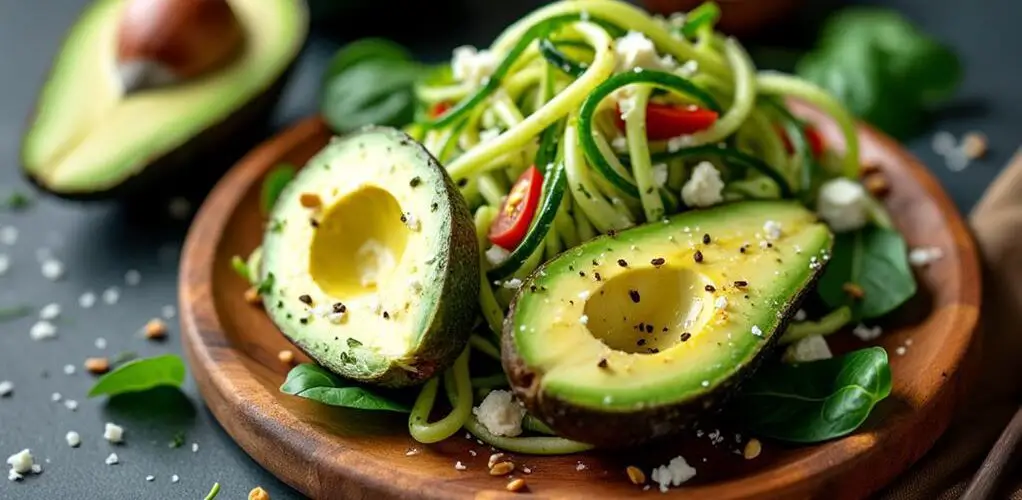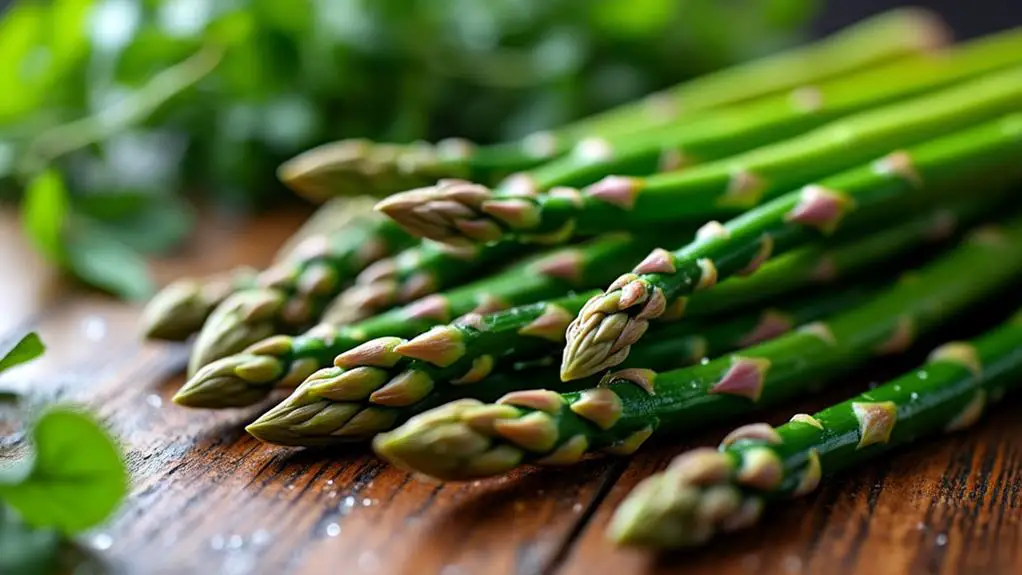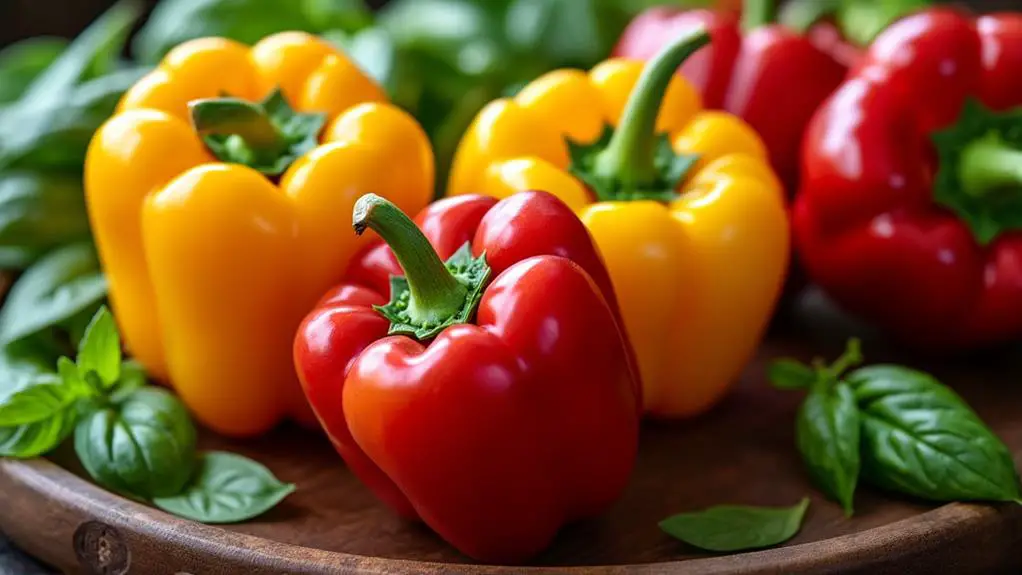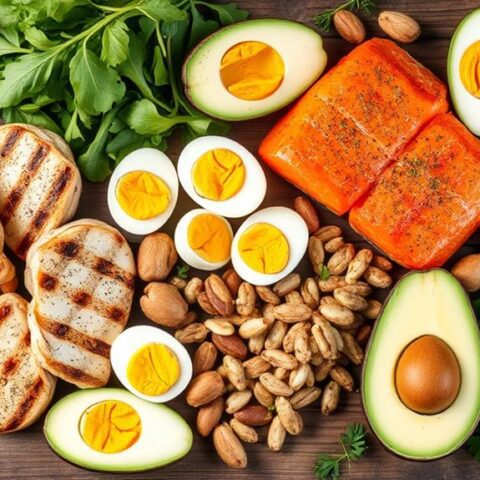
Starting a ketogenic journey necessitates choosing vegetables that are low in carbohydrates yet rich in essential nutrients. Cauliflower, with its versatile culinary uses, sets the stage, followed by creamy avocado loaded with healthy fats. Broccoli, rich in fiber, complements cabbage which promotes fullness. Zucchini, often a pasta substitute, and spinach, a powerhouse of vitamins, are stalwarts of the diet. Asparagus hydrates while mushrooms provide umami flavor and essential B vitamins. Bell peppers bring a vibrant antioxidant boost, and kale, with its substantial fiber content, rounds out the list. Each selection contributes to health and variety, enhancing any keto meal plan.
Key Takeaways
- Cauliflower and zucchini are low in carbs and versatile for keto-friendly dishes.
- Avocado offers healthy fats and fiber, ideal for maintaining ketosis.
- Spinach and asparagus are nutrient-rich, with minimal carbs and high antioxidant properties.
- Mushrooms provide umami flavor and essential nutrients with low carbohydrate content.
- Bell peppers and broccoli are rich in vitamins and enhance flavor in keto meals.
Cauliflower
Cauliflower emerges as a quintessential keto-friendly vegetable due to its low carbohydrate content, with only 3 grams of net carbs per 100 grams. This makes it an ideal choice for those adhering to a ketogenic diet, where carbohydrate intake is greatly restricted.
Beyond its favorable macronutrient profile, cauliflower nutrition is enhanced by its abundance of vitamins C and K, offering antioxidant properties and supporting bone health, respectively. With approximately 25 calories per 100 grams, it is also a low-calorie option, which aligns well with weight management goals.
In addition, broccoli and cauliflower are known to support health and ketosis, making them excellent choices for those on a keto diet. Furthermore, cauliflower's fiber content contributes to digestive health and promotes a sense of fullness, which can be beneficial for those seeking to control their appetite.
Its versatility in the kitchen has led to a plethora of cauliflower recipes that cater to low-carb eating plans. For instance, it can be transformed into cauliflower rice, offering a grain-free alternative that mimics the texture of traditional rice.
Additionally, cauliflower can be mashed to resemble potatoes or used as a base for pizza crusts, providing a similar mouthfeel with fewer carbohydrates. Integrating cauliflower into meals through roasting, steaming, or incorporating into soups and casseroles provides diverse and flavorful culinary options.
Avocado
Following the culinary versatility and nutritional benefits of cauliflower, avocado stands out as another exemplary keto-friendly vegetable, or more accurately, fruit. With only 2g of net carbs per 100g, it is a prime choice for those adhering to a ketogenic diet.
Avocado varieties such as Hass and Fuerte offer distinct textures and flavors, making them adaptable for various dishes. The benefits of incorporating avocados into a keto diet extend beyond their low carbohydrate content.
Avocados are rich in heart-healthy monounsaturated fats, which have been shown to improve cholesterol levels and promote cardiovascular health. They also provide a substantial amount of potassium, approximately 485mg per 100g, supporting electrolyte balance essential for individuals on low-carb diets.
Additionally, the high dietary fiber content, around 7g per 100g, aids digestion and enhances gut health. Consuming avocados can also contribute to better satiety, making them a valuable component in maintaining a balanced keto diet.
The versatility of avocados is significant, allowing them to be used in diverse culinary applications:
- Salads: Avocados add a creamy texture and rich flavor.
- Smoothies: They can be blended for a nutrient-dense addition.
- Spreads or Toppings: Used as a healthy alternative to butter or mayonnaise.
Broccoli
Broccoli is a standout among keto-friendly vegetables, boasting only about 4g of net carbs per 100g, making it an excellent choice for those maintaining a low-carb lifestyle. This cruciferous vegetable is not only low in carbohydrates but also rich in essential nutrients, offering substantial broccoli benefits.
It is packed with vitamins C and K, which play significant roles in supporting immune function and promoting bone health, respectively. Additionally, its high fiber content aids digestion and enhances satiety, which can be beneficial for weight management.
Low-carb vegetables like broccoli are emphasized in a vegetarian keto diet to maintain fiber intake while limiting carbs. In addition to its nutritional profile, broccoli is versatile in the kitchen, with various cooking methods available to suit diverse culinary preferences.
Whether steamed, roasted, or stir-fried, broccoli retains its nutritional integrity while adding texture and flavor to dishes. Steaming is an excellent method to preserve its vitamin content, while roasting can enhance its natural flavors, adding a delightful crispiness.
Moreover, broccoli is a source of antioxidants, compounds known to reduce inflammation and potentially lower the risk of chronic diseases.
This combination of low carbohydrates, essential nutrients, and health-promoting properties makes broccoli an outstanding choice for individuals adhering to a ketogenic diet.
Cabbage
In the domain of keto-friendly vegetables, cabbage stands out with its low net carb content of approximately 3g per 100g, positioning it as a suitable choice for those adhering to a ketogenic diet.
Cabbage is not only a low-carb option but also rich in essential nutrients such as vitamins C and K, which are vital for supporting immune function and maintaining bone health. Additionally, its high fiber content aids digestion and promotes a feeling of fullness, which can be advantageous for weight management. Its nutrient profile also contributes to enhanced energy levels, a benefit often experienced by those on a ketogenic diet.
The versatility of cabbage is reflected in its numerous varieties and cooking techniques. From the crisp texture of green cabbage to the subtle sweetness of red cabbage, each variety offers unique culinary possibilities.
Cooking techniques can vary, enhancing cabbage's flavor and nutritional benefits:
- Raw: Enjoyed in salads for a revitalizing crunch.
- Fermented: Turned into sauerkraut, boosting probiotic content.
- Cooked: Incorporated into stir-fries or soups, adding depth and texture.
Cabbage is also low in calories, offering about 25 calories per 100g, making it an excellent choice for those looking to reduce caloric intake while remaining keto-friendly.
This balance of nutrients and versatility underscores cabbage's value in a ketogenic diet.
Zucchini
Zucchini stands out as a low-carb nutrient powerhouse, offering just 3g of net carbs per 100g, making it an excellent choice for those adhering to a ketogenic diet.
Its versatility in cooking is significant, as zucchini can be prepared in numerous ways—spiralized into noodles, roasted, grilled, or sautéed—each method enhancing its mild flavor and capacity to absorb spices and seasonings.
Furthermore, zucchini is an example of above-ground vegetables that typically contain under 5 grams of net carbs per serving, fitting perfectly into a low-carb meal plan.
Additionally, its high water content and rich supply of vitamins A and C contribute to hydration, satiety, and overall health, further solidifying its role as a staple in keto-friendly meal planning.
Versatile Cooking Options
A staple in many keto-friendly kitchens, zucchini offers a multitude of versatile cooking options that make it an ideal choice for those seeking low-carb alternatives. This vegetable contains only 3g net carbs per 100g, making it an excellent fit for keto diets. Its ability to be transformed into zucchini noodles, or "zoodles," provides a healthy substitute for traditional pasta. These zoodles can be incorporated into a variety of dishes, offering a textural and flavorful alternative while maintaining low carbohydrate content.
Zucchini's versatility extends beyond zoodles, as it can be prepared using different methods to enhance its flavor profile. Grilling techniques, for instance, allow zucchini to absorb enticing smokiness and pair well with diverse seasonings and sauces. Additionally, zucchini can be roasted or sautéed, providing further opportunities to experiment with and enhance its taste.
Moreover, zucchini's adaptability shines in baking applications, such as in zucchini bread or muffins, where it contributes moisture and keeps the carb count minimal. Its high water content also aids in hydration and supports weight management by promoting feelings of fullness, making zucchini a multifaceted ingredient within a keto dietary framework.
- Spiralizing: Transform zucchini into nutritious noodles.
- Grilling: Impart smoky flavors with simple techniques.
- Baking: Use in bread or muffins for added moisture.
Low-Carb Nutrient Powerhouse
Nutritional abundance manifests in zucchini, a vegetable celebrated for its low-carb content and rich nutrient profile, making it an invaluable asset to keto diets. With only 3 grams of net carbs per 100 grams, zucchini stands as an excellent choice for those adhering to low-carbohydrate regimens. Its high water content not only contributes to its low-calorie nature but also aids in hydration support, an essential factor for maintaining ideal body function on a ketogenic diet.
Zucchini benefits extend far beyond its macronutrient composition. It is a powerhouse of vitamins, particularly vitamins A and C, which are key antioxidants. These compounds can bolster overall health by reducing oxidative stress and inflammation.
Additionally, the presence of potassium in zucchini supports muscle function and helps maintain electrolyte balance, which is particularly beneficial for individuals on ketogenic diets, who may experience fluctuations in these important minerals.
Versatility further enhances zucchini's appeal, as it can be spiralized into low-carb "noodles" or incorporated into diverse culinary creations like fritters and casseroles. This adaptability, coupled with its nutritional virtues, underscores zucchini's status as a low-carb nutrient powerhouse suitable for a ketogenic lifestyle.
Spinach
Among the diverse array of vegetables suitable for a ketogenic diet, spinach stands out as a particularly advantageous choice. Known for its low carbohydrate content, spinach provides only 1g of net carbs per 100g, making it an ideal component of a ketogenic meal plan.
Beyond its carb-friendly profile, spinach health benefits are substantial due to its rich composition of essential nutrients such as iron, calcium, and vitamins A, C, and K. These nutrients collectively support bodily functions, from bone health to immune system efficiency.
Adding low-carb vegetables like spinach to your keto pantry is essential for maintaining a balanced diet. Spinach meal prep is both simple and varied, enhancing its appeal. This leafy green's versatility allows for its incorporation into numerous dishes. Consider these options:
- Salads: Fresh spinach leaves can serve as a base or complement to other low-carb ingredients.
- Smoothies: Blending spinach into smoothies provides a nutrient boost without altering taste noticeably.
- Cooked Dishes: Spinach can be added to frittatas or soups, enhancing flavor and nutritional value.
Additionally, spinach is packed with antioxidants that combat oxidative stress, promoting overall wellness. Its low-calorie density also aids in satiety, making it an effective tool for weight management on a ketogenic diet.
Asparagus

Asparagus stands out as a nutrient-rich and low-carb vegetable, with approximately 2g of net carbs per 100g, making it an excellent choice for those adhering to a keto diet.
Its abundance of vitamins and minerals, including vitamins A, C, E, and K, as well as iron and potassium, supports overall health while maintaining a low-calorie profile.
Additionally, asparagus is beneficial for heart health due to its ability to improve HDL cholesterol and reduce triglycerides.
It also offers versatile cooking options, whether enjoyed raw, steamed, roasted, or grilled, adding both flavor and nutritional value to various meals.
Nutrient-Rich and Low-Carb
Renowned for its nutritional profile, asparagus stands out as an exemplary choice for those adhering to a ketogenic diet, offering a mere 2 grams of net carbohydrates per 100 grams. Asparagus benefits extend beyond its low-carb appeal; it is a powerhouse of essential nutrients, including iron, potassium, and vitamin C. These nutrients play vital roles in maintaining overall health, supporting functions such as oxygen transport, electrolyte balance, and immune support.
Furthermore, the high water content in asparagus contributes greatly to hydration effects, making it an effective component in promoting ideal hydration levels while aiding in weight management due to its low-calorie profile.
To further appreciate asparagus, consider the following points:
- Antioxidant Properties: Asparagus is rich in antioxidants, which may reduce oxidative stress and inflammation, important factors in chronic disease prevention.
- Nutrient Density: With a balance of vitamins and minerals, asparagus supports various bodily functions without adding excess carbohydrates or calories.
- Dietary Versatility: While avoiding specifics of cooking methods, asparagus's nutrient profile remains intact whether consumed raw or cooked, enhancing its appeal across dietary preferences.
Versatile Cooking Options
Building on its impressive nutrient profile, asparagus offers a wide range of culinary possibilities that align perfectly with ketogenic dietary goals. With only 2g of net carbs per 100g, asparagus is an ideal low-carb vegetable that can be seamlessly integrated into a variety of dishes. This versatility is further exemplified in its ability to be prepared through multiple cooking techniques, including roasting, grilling, or steaming, each bringing out distinct flavors and textures.
Asparagus can be enjoyed raw in vibrant asparagus salads, enhancing both the nutritional value and the visual appeal of the dish. Pairing it with high-fat sauces such as hollandaise or pesto not only boosts its taste but also adheres to keto principles by maintaining a high-fat content. Here's a quick overview of cooking methods and pairings:
| Cooking Technique | Taste/Texture | Pairing Suggestions |
|---|---|---|
| Raw (Salads) | Crisp, Fresh | Lemon Vinaigrette |
| Roasted | Nutty, Tender | Hollandaise Sauce |
| Grilled | Smoky, Firm | Garlic Butter |
| Steamed | Soft, Subtle | Pesto |
Rich in vitamins A, C, E, and K, and a good source of fiber, asparagus not only supports digestive health but also enhances satiety, making it a valuable addition to any keto meal plan.
Mushrooms
In the domain of keto-friendly vegetables, mushrooms stand out due to their low carbohydrate content and high nutritional value. With approximately 3.26 grams of carbs per 100 grams, they are an excellent choice for those adhering to a ketogenic diet.
Various mushroom varieties, such as shiitake, portobello, and cremini, not only contribute a unique umami flavor to dishes but also offer numerous health benefits. These include being rich in essential nutrients like potassium (318 mg per 100 grams), which is essential for maintaining electrolyte balance and supporting cardiovascular health.
Additionally, mushrooms can be a flavorful complement to grass-fed beef dishes, enhancing their taste and nutrient profile. Mushrooms are also a notable source of B vitamins, including riboflavin and niacin, both of which are important for energy metabolism.
Their versatility in culinary applications enhances their appeal in low-carb diets. They can be incorporated into meals in several ways, offering both nutritional and gastronomic benefits:
- Sautéed: Quick cooking in a small amount of oil or butter retains their nutrients and flavor.
- Grilled: Provides a smoky flavor, making them a perfect complement to meats.
- Incorporated into omelets and stir-fries: Adds texture and depth, enriching these dishes without introducing significant carbs.
Through these methods, mushrooms can be seamlessly integrated into a keto lifestyle.
Bell Peppers

Bell peppers are an excellent addition to a keto diet, offering a low carb content of approximately 6g of net carbs per 100g alongside a rich supply of vitamin C and antioxidants, particularly in red varieties.
They can be paired with healthy fat sources like avocados and olive oil for a nutritious keto dish. Their versatility in culinary applications allows them to enhance dishes such as salads, stir-fries, and casseroles while maintaining nutritional integrity.
When incorporating bell peppers into a keto meal plan, it is essential to take into account their carb content to maintain dietary balance while enjoying their health benefits and flavor.
Nutritional Benefits Overview
When considering vegetables suitable for a keto diet, bell peppers stand out as a nutritionally rich option. They offer significant health benefits while aligning with the low-carb requirements of the diet. Remarkably, bell peppers contain approximately 6g of net carbs per 100g, making them a prime candidate for keto-friendly meals.
The rich vitamin C content is another compelling attribute; a medium red bell pepper provides about 169% of the daily recommended intake, supporting immune function and skin health. Additionally, bell peppers are abundant in antioxidants, particularly carotenoids, which play a significant role in combating oxidative stress.
The diverse cooking methods available for bell peppers also enhance their appeal. They can be consumed raw, roasted, or stuffed, adding versatility to meal planning while maintaining a low carbohydrate profile.
Moreover, their fiber content, approximately 2g per 100g serving, aids in digestion and promotes overall gut health, an essential component of any balanced diet.
To emphasize their nutritional value:
- Low in Carbs: Ideal for keto diets with only 6g of net carbs.
- High in Vitamin C: Boosts immune function and skin health.
- Rich in Antioxidants: Helps combat oxidative stress.
Culinary Uses and Recipes
A myriad of culinary possibilities awaits those incorporating bell peppers into their diet, particularly for individuals adhering to a keto regimen. With their low carbohydrate content—approximately 6 grams per 100 grams—bell peppers are a versatile ingredient that can be employed in various bell pepper recipes. Their rich vitamin C and antioxidant levels make them a nutritious choice, supporting immune function and overall health.
Culinary techniques for bell peppers are as diverse as their vibrant hues, which include red, yellow, and green varieties. These colors not only enhance the visual appeal of dishes but also introduce an array of phytonutrients.
Raw bell peppers can be thinly sliced for salads, adding a fresh, crisp texture. For a more substantial dish, they can be hollowed out and stuffed with meats and cheeses, offering a hearty yet keto-friendly meal option. Roasting is another technique that draws out their natural sweetness, complementing a range of dishes.
Incorporating bell peppers into stir-fries enables home cooks to enhance flavor and texture while maintaining low carbohydrate content. Additionally, they serve as an excellent base for salsas, providing flavorful, nutrient-rich options that align with ketogenic dietary goals.
Carb Content and Moderation
Understanding the carbohydrate content of bell peppers is essential for those adhering to a ketogenic diet, where maintaining low carb intake is necessary.
Bell peppers, especially red ones, contain approximately 6g of net carbs per 100g, categorizing them as a moderate option for keto enthusiasts. Despite their slightly higher carb content compared to non-starchy vegetables, they are a beneficial source of vitamin C and antioxidants, contributing positively to overall health.
Effective carb counting and portion control are important to incorporate bell peppers into a keto diet without exceeding daily carb limits.
Key Points for Keto Dieters:
- Carb Variance: Red bell peppers have about 6g net carbs per 100g, while green bell peppers offer a lower-carb alternative at approximately 4g net carbs per 100g.
- Health Benefits: Rich in vitamin C and antioxidants, bell peppers support health while adhering to low carb intake.
- Usage Suggestions: Consider using bell peppers as crunchy additions to salads or as vessels for stuffing with high-fat ingredients to maintain the balance of macronutrients.
Kale
Incorporating kale into a keto diet offers a nutritious and low-carb option that supports overall health. With approximately 10g of carbohydrates per 100g, kale is a suitable choice for those adhering to a ketogenic lifestyle. Its nutrient density is impressive; kale is rich in vitamins A, K, C, and E, which are vital for immune function and bone health.
Additionally, kale can aid in improving insulin sensitivity due to its low carbohydrate content, supporting type 2 diabetes management. The kale nutrition profile also includes high fiber content, which aids digestion and promotes feelings of fullness—beneficial for weight management within a low-carb diet.
Kale's versatility makes it a staple in keto meal planning. It can be consumed raw in salads, baked into chips, or sautéed as a side dish. For those seeking creative culinary options, kale smoothies provide a rejuvenating way to enjoy its benefits without compromising on carbohydrate limits.
Furthermore, the antioxidants in kale help combat oxidative stress and reduce inflammation, supporting overall well-being.
While kale is a valuable addition to a ketogenic diet, it is important to balance its intake with other low-carb vegetables to guarantee a diverse nutrient intake. This balanced approach can optimize the health benefits associated with a keto lifestyle.
Frequently Asked Questions
What Vegetables Are Good on Keto?
Keto vegetable benefits include low-carb cooking options, such as spinach, zucchini, and cauliflower, which are excellent due to their minimal carbohydrate content, high fiber, and nutrient density, supporting a balanced diet while maintaining ketosis effectively.
What Are the Top 10 Keto Foods?
When discussing top keto foods, consider incorporating keto meal planning with low carb snacks such as nuts, cheese, eggs, and avocados, focusing on nutrient density and healthy fats to maintain ketosis while ensuring a balanced nutritional intake.
What Are 7 Great Vegetables to Cut Down on Carbs?
To reduce carbohydrate intake effectively, consider these vegetables: spinach, zucchini, cauliflower, asparagus, broccoli, bell peppers, and mushrooms. Utilizing low carb benefits, these vegetables can be prepared through steaming, grilling, or incorporating into various nutritious dishes.
Which Vegetables Are Not Keto Friendly?
Non keto vegetables include high carb greens such as potatoes, sweet potatoes, cassava, and beets. These vegetables contain significant carbohydrate content, making them unsuitable for a ketogenic diet, which prioritizes low-carb intake to maintain ketosis.
Conclusion
The inclusion of vegetables such as cauliflower, avocado, broccoli, cabbage, zucchini, asparagus, mushrooms, bell peppers, and kale aligns well with the ketogenic dietary approach due to their low carbohydrate content and high nutritional value. These vegetables provide essential vitamins, minerals, and fiber, supporting overall health while maintaining ketosis. A balanced and varied intake of these keto-friendly vegetables can aid in achieving dietary goals, emphasizing the importance of informed food choices in maintaining a healthy ketogenic lifestyle.









No Comments